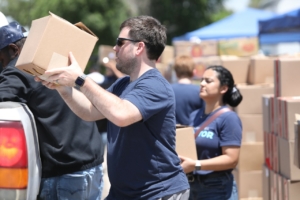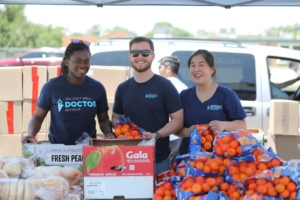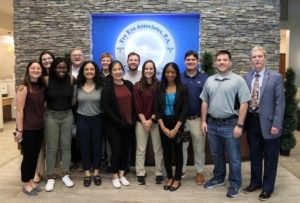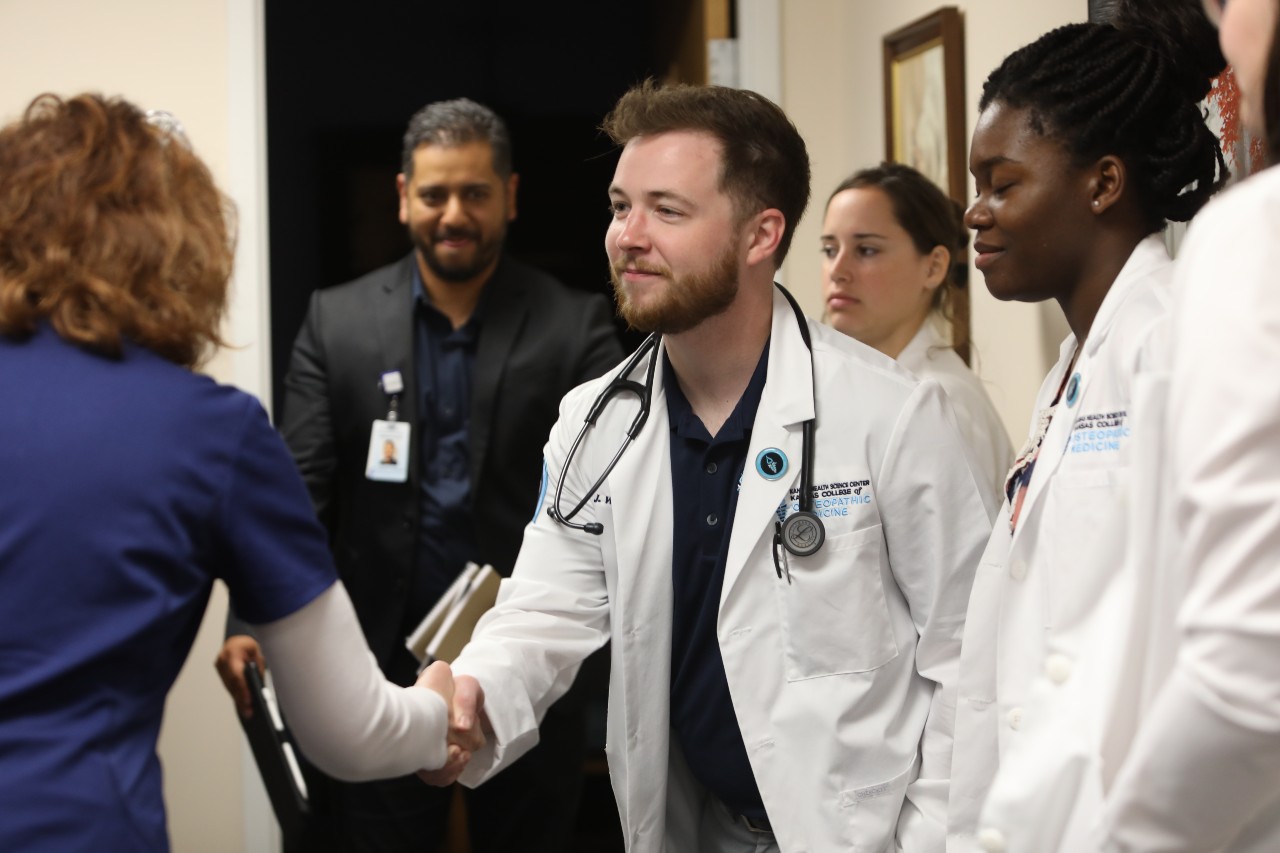KHSC-KansasCOM has launched a program to place student doctors in rural medical facilities that desperately need them.
In June, 11 students from KHSC-KansasCOM packed up and headed west. Their destination was Garden City, Kansas, a community of about 30,000 and four hours’ drive from Wichita. They spent five days meeting with local health care professionals, civic leaders, and young professionals, as well as touring medical facilities and engaging in community outreach.
A new vision for rural medicine
The visit signaled KHSC-KansasCOM’s launch of a pilot program called the Medical Education Hub Project, or MedEd Hub for short. Through this initiative, the college is reimagining how medical colleges engage with rural communities. Its objective is to ease the shortage of physicians while at the same time providing opportunities for medical student rotations.
“We have a lot of clinical faculty with rural experience,” Vice President of Advancement Molly Fox says. “We gathered around a table and talked about how the barriers to care in rural areas are unique to each community, and that there is no one-size-fits-all solution.”
From those conversations came the idea of developing the MedEd Hub program, which would employ a hub-and-spoke model through which students would travel to a community outside of Wichita, live there, learn the area, and have their spouses or partners and family go with them.
Centura St. Catherine Hospital in Garden City, which serves a good portion of southwest Kansas, struck KansasCOM leadership as an ideal facility to put the MedEd Hub concept to the test. There is a great need for services and the hospital is understaffed.
“Their circumstances made a good opportunity for KansasCOM to be part of a solution,” Fox says. “What started as a need for us to develop clinical rotations became an opportunity for us to really serve our mission, in that we could help serve the needs of this community while the students are learning.”
Five days in Garden City
The students moved into dorms at Garden City Community College on a Monday, and they had dinner that night with KHSC-KansasCOM faculty member Robin Durrett, DO, and William Clifford, MD, an ophthalmologist and a member of the Kansas State House of Representatives. They discussed the advantages of rural medicine, including opportunities for steady income growth and for becoming leaders in the community above and beyond their work as physicians.
member Robin Durrett, DO, and William Clifford, MD, an ophthalmologist and a member of the Kansas State House of Representatives. They discussed the advantages of rural medicine, including opportunities for steady income growth and for becoming leaders in the community above and beyond their work as physicians.
After dinner, the students toured Dr. Clifford’s clinic, and he asked them if they would like to scrub in to observe a surgical procedure, which they did. The procedure was scheduled for that Thursday.
Tuesday was devoted to meeting community leaders from the private and public sectors. First came a tour of Garden City with the economic development team from Finney County, which replicated the kind of high-level recruitment tour they would take if they were being recruited as physicians to choose to practice in the area. Next, they had lunch with the city commissioners, the city manager, and local first responders. They learned that Garden City is a diverse community that is thriving economically.
 In the evening, the student doctors attended a reception hosted by Next Gen, the young professionals group of the Chamber of Commerce, to gain an understanding of the social advantages Garden City can offer to young doctors in their careers and family life.
In the evening, the student doctors attended a reception hosted by Next Gen, the young professionals group of the Chamber of Commerce, to gain an understanding of the social advantages Garden City can offer to young doctors in their careers and family life.
Wednesday, the student-doctors toured Centura St. Catherine’s Hospital where they met with the physicians and the medical director and shadowed doctors on their rounds. On Thursday, their exposure to medical facilities continued when they observed a procedure in Dr. Clifford’s clinic.
“It’s an immersion program,” Dr. Durrett says, “getting them used to practicing in a rural community and getting used to the hospital where some will be spending their third year of medical school.”
A core tenet of KHSC-KansasCOM is recognizing the importance of social determinants on health, which is why service is a significant focus of the curriculum. “So as part of a day of service, the students spent Thursday afternoon at Genesis Health Clinic, a federally qualified health care center, distributing food to hundreds of families at a mobile pantry. “Being part of the community that you live in and work in is a fundamental part of practicing medicine,” student doctor Tonya Gupta says.
Carrying lessons forward
Friday was the last day of the visit. The students met to debrief on their experiences, then drove to Dodge City for a tour of the St. Catherine Hospital campus there. With that, the first MedEd Hub delegation returned to Wichita. Says Fox, “Their only complaint was that there wasn’t enough time.”
Hospital campus there. With that, the first MedEd Hub delegation returned to Wichita. Says Fox, “Their only complaint was that there wasn’t enough time.”
If the intention of the visit was to blend rural hospital experience with a taste of what it’s like to live in a small, tightknit community, the participants agreed the week was an overwhelming success.
“I think that the program was amazing, and I am honored to have been chosen for this experience,” says Hannah Cruse, KansasCOM class of 2026. “I loved learning about the city and health care in rural Kansas. This program really impacted my own view of rural medicine and what I want to do after medical school.”

